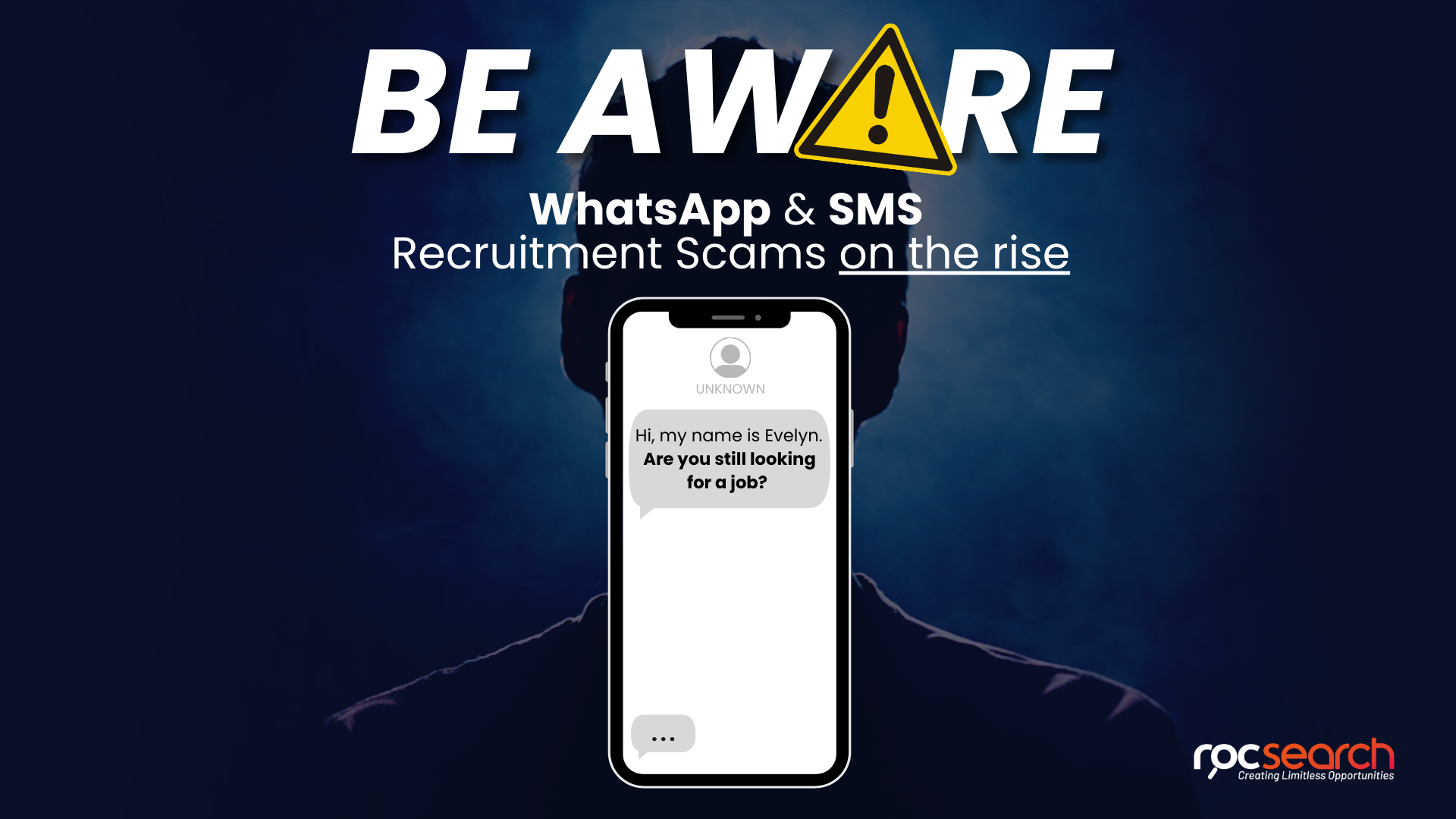
Beware of WhatsApp & SMS Recruitment Scams: How the scams work, the risks and how to protect yourself
06 Feb, 202510 MinutesIn today's digital age, tech scams are becoming increasingly sophisticated and more prev...

In today's digital age, tech scams are becoming increasingly sophisticated and more prevalent by the day. One particularly concerning trend we've noticed is the rise of scammers impersonating recruitment companies via text or on platforms like WhatsApp. These deceptive individuals are meticulously crafting an elaborate recruitment process to gain your trust, ultimately with the goal of stealing your personal information for malicious purposes. This information can then be used in a variety of harmful ways, putting you at significant risk. As highlighted in a recent BBC News article titled “I had £3,000 stolen via WhatsApp Job Scam”, the consequences of falling victim to these scams can be severe.
As a Cyber Essentials certified business, Roc Search are committed to your safety and the security of your data. As part of this commitment to you, we would like to outline how the scam works and how you can protect yourself from these fraudulent activities.
With that in mind, We want to emphasise that Roc Search will never ask for sensitive/financial information via WhatsApp or SMS. Our recruitment process is professional and transparent to ensure we do everything to protect you and your information.If you ever have any doubts about the legitimacy of any communication you've received, please don't hesitate to contact us directly on info@roc-search.com or 0118 900 6750 (UK) / +1 (512) 649 1070 (USA). These contact details are listed on our official website - www.roc-search.com.
How the Scam Works:
These scams often begin with an unsolicited message via WhatsApp, seemingly from a recruiter. They might offer attractive job opportunities, often with high salaries or flexible hours, designed to pique your interest. The scammers then guide you through a seemingly legitimate recruitment process, which may include interviews (often conducted via video call), requests for references, and even fake job offers. This elaborate charade is designed to build trust and make the opportunity appear genuine. However, the ultimate goal is to extract your personal information, which can include:
- Identity details: This could include your name, address, date of birth, and even copies of your identification documents like passports or driver's licenses.
- Financial information: Scammers may try to trick you into providing your bank account details, credit card numbers, or other financial information under the guise of setting up payroll or processing expenses.
- National Insurance/Social Security numbers: This highly sensitive information can be used for identity theft.
The Risks:
Once the scammers have your information, they can use it for a variety of malicious purposes, including:
- Identity theft: They can use your personal details to open bank accounts, apply for loans, or make purchases in your name.
- Financial fraud: They can access your bank accounts and steal your money.
- Phishing attacks: They can use your information to craft more convincing phishing emails or messages, targeting you or your contacts.
- Selling your data: They can sell your information to other criminals on the dark web.
How to Protect Yourself:
- Be wary of unsolicited messages: Be extremely cautious of any job offers or recruitment messages you receive out of the blue, especially if they seem too good to be true.
- Verify the recruiter's identity: If you receive a message from someone claiming to be from a recruitment company, and you're unsure of its legitimacy, contact the recruitment company directly using the contact details found on their website. They will be able to verify the identity of the recruiter and the legitimacy of the job offer/role. Do not rely on contact information provided in the WhatsApp message itself.
- Never share sensitive information: Do not provide your bank details, Social Security number/National Insurance number, or other sensitive personal information to anyone you haven't thoroughly verified. Legitimate recruiters will never ask for this information via WhatsApp or text.
- Research the company: If you're contacted about a job opportunity, do your own research on the company. Check their website, LinkedIn profile, and other online presence to ensure they are legitimate.
- Trust your instincts: If something feels off or suspicious about the recruitment process, trust your gut and proceed with extreme caution. It's always better to be safe than sorry!
Finally, if you come across a scam message, you should do your part by reporting it. This will protect others from falling victim to it. WhatsApp has lots of advice on how to protect yourself from scams on its website here. You can also report a scam text message externally by forwarding it to 7726 (which spells out SPAM on a keypad). If it's a spam email forward it to report@phishing.gov.uk
As always, if you would like any more information or support from the team at Roc Search, please do get in touch and our team will be happy to help - https://www.roc-search.com/contact-us/




